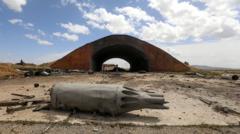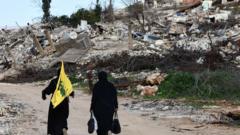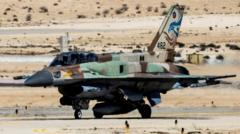The recent Israeli air strikes in Syria targeting military installations have intensified tensions not only in the region but also between Israel and Turkey, both seeking influence in the aftermath of the Assad regime's fall. While Syria’s new leadership aims for stability and normalizing relations, external pressures complicate their efforts, raising fears of renewed conflict.
Rising Tensions: Israel's Air Strikes on Syria Spark Diplomatic Rift with Turkey

Rising Tensions: Israel's Air Strikes on Syria Spark Diplomatic Rift with Turkey
Israel's recent military actions in Syria have raised concerns about the geopolitical landscape in the Middle East, particularly in relation to its complex relationship with Turkey.
Israel has stepped up its military operations in Syria, notably bombing several military sites, including the Hama military airport and the T4 airbase near Homs. The Syrian foreign ministry reported extensive damage to the Hama base, with casualties including the death of several defence ministry employees. These strikes, according to multiple analysts, appear not just targeted towards Syria but carry a message directed at Turkey, which is negotiating a defense pact with Syria's interim president, Ahmed al-Sharaa.
The turmoil arises as Turkey's foreign ministry condemns Israel's actions as destabilizing, alleging that they exacerbate chaos in the region and contribute to terrorism. In contrast, Turkish officials, including Foreign Minister Hakan Fidan, emphasized that Turkey does not seek confrontation with Israel but supports Syria's autonomy in policymaking.
Israel's government has publicly criticized Turkey's involvement in Syria, accusing it of undermining regional security. This diplomatic rift comes amid heightened tensions between Turkey and Israel that escalated following the onset of the Gaza war in October 2023, where both nations have exchanged harsh rhetoric, blurring the lines of regional alliances.
The new Syrian administration under President Sharaa, which is seen less favorably by Israel due to his previous leadership in the Syrian branch of al-Qaeda, is attempting to chart a path toward stability and normalize relations with Israel. Sharaa has indicated a desire for peace, but Israel's persistent military incursions complicate these efforts.
Israel's military strategy focuses on preventing weapons transfers to adversaries like Hezbollah while asserting control over southern Syrian territories, conducting numerous ground incursions, and engaging in direct military actions against perceived threats. Civilian casualties resulting from these operations have stirred sentiments among Syrian citizens, prompting them to reassess their views on Israel.
Recent violence in Syria, including significant loss of life among the Alawite minority and sporadic outbreaks of unrest, highlights the fragile internal situation within the country. The potential for external powers to exploit that instability is increasingly evident, further complicating an already precarious regional dynamic.
The intersection of Israeli operations, Turkish ambitions, and Syrian government aspirations paints a complex picture where external influence continues to shape the prospects for peace and stability in the Middle East. As the Syrian populace grapples with external interventions, the enduring legacy of the civil war reminds them of the precariousness of their future stability.



















